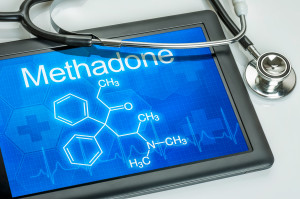 Individuals who are addicted to heroin and other opiate products, including oxycodone, will experience severe and often-dangerous physical and psychological withdrawal symptoms when they stop using these drugs. Those symptoms are cited as a primary reason for relapses when heroin addicts are in rehab. Methadone is used to ease the worst of those symptoms and to give a recovering addict a better opportunity to stay away from heroin and other opiates as his body readjusts to life apart from drug addiction.
Individuals who are addicted to heroin and other opiate products, including oxycodone, will experience severe and often-dangerous physical and psychological withdrawal symptoms when they stop using these drugs. Those symptoms are cited as a primary reason for relapses when heroin addicts are in rehab. Methadone is used to ease the worst of those symptoms and to give a recovering addict a better opportunity to stay away from heroin and other opiates as his body readjusts to life apart from drug addiction.
Methadone has been available to treat opiate addiction for more than eighty years. It is a synthetic, slow-acting opioid agonist, which means that it binds to the same receptors in a heroin addict’s brain that would otherwise be compromised by heroin. It does not generate the same “high” feeling that a heroin addict feels in his initial stages of heroin use. Clinics and treatment centers that have been approved to dispense methadone will typically administer it in pill or liquid form that is taken orally. Recovering heroin addicts may need to remain in a methadone maintenance program for weeks or months or, in very extreme cases for more than a year. In all cases, methadone is administered daily and the effects of a single dose of methadone will last for twenty-four to thirty-six hours.
Over a longer period of methadone maintenance, the concentration of methadone in a recovering addict’s system will increase and he can be weaned off of methadone with few or none of the withdrawal symptoms that he would experience if he were to quit taking heroin without methadone treatments. Methadone is universally endorsed as a safe and effective heroin addiction treatment. Individuals who are on methadone maintenance programs are able to participate in their regular daily activities with no impairment or functional problems.
Methadone is not, in and of itself, a cure for heroin addiction. Recovering heroin addicts will always be at a heightened risk for relapses, particularly after the addict’s methadone maintenance has been terminated. Heroin and opiate addictions are chronic diseases. Methadone is only used to alleviate the worst withdrawal symptoms associated with those diseases. For successful recovery and long-term sobriety, heroin and opiate addicts will need to combine methadone maintenance with other behavioral therapy that gives them the tools to recognize the triggers that might drive them to renewed heroin use and that creates other coping mechanisms to help them handle those triggers.
Generally, the first few days or weeks of a methadone maintenance program will require a recovering addict to stay at an inpatient addiction recovery center. A heroin addict’s physicians will need to monitor the addict’s early responses to methadone. Heroin and opiate addicts will have no control over the amounts, strengths, and concentrations of heroin or other opiates that they previously consumed, and a treating physician will need to adjust methadone administration to match each individual addict’s needs. Methadone will not work for every addict, and certain side effects are associated with methadone, including headaches, constipation, nausea, and mood swings. Methadone is a low-cost heroin addiction treatment, but if it is ineffective, an addict’s physician might recommend a higher-cost pharmaceutical, such as Suboxone.
If you are addicted to heroin or other opiates and would like more information about how methadone programs can help you defeat that addiction, please contact the staff and counselors at the Lead Recovery Center at 1-800-380-0012. We will consult with you to determine if you are a good candidate for methadone or some other pharmaceutical addiction recovery treatment, and we will help you begin your journey back to sobriety.

